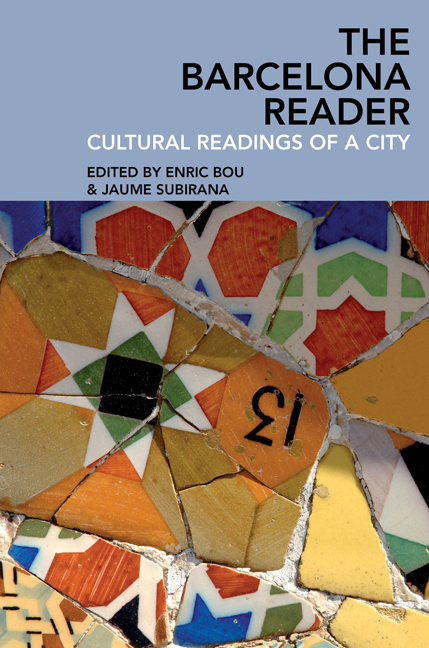Book contents
- Frontmatter
- Contents
- List of illustrations
- Notes on contributors
- Introduction: Barcelona: Cultural readings of a city
- I City, history, and territory
- II City and society
- III Art, architecture, and the city
- IV The Olympics and the city
- V Literature, cinema, and the city
- 15 La Gran Encisera: Three odes to Barcelona, and a film
- 16 The deceptive dame: Criminal revelations of the Catalan capital
15 - La Gran Encisera: Three odes to Barcelona, and a film
from V - Literature, cinema, and the city
- Frontmatter
- Contents
- List of illustrations
- Notes on contributors
- Introduction: Barcelona: Cultural readings of a city
- I City, history, and territory
- II City and society
- III Art, architecture, and the city
- IV The Olympics and the city
- V Literature, cinema, and the city
- 15 La Gran Encisera: Three odes to Barcelona, and a film
- 16 The deceptive dame: Criminal revelations of the Catalan capital
Summary
Whatever else Catalonia might be, it is a macrocephalic organism, its head being the city of Barcelona. Barcelona is the biggest human conglomeration on the shores of the Mediterranean, its metropolitan area holds 83 per cent of the population of Catalonia (Mestre and Hurtado: 264). Today the city is more recognized than its country in the imaginary of an affluent and roaming international ‘community’. Barcelona is ‘in’. But Barcelona is also the head that devours its own body, relegating its hinterlands to the status of suburbs. Yet this rise of the city does not seem to upset Catalans in general. Having failed to build for themselves a nation-state, Catalans have transferred the focus of nationalist desire to their capital city. As Barcelona grows in population and as admiration for its architecture grows among foreigners, the aspiration for an independent Catalan nation wanes. The apparent success of the city in the international imaginary has wrestled the title of primary identity away from its haggard and laggard nation.
One of the first to pay attention to the growth of symbolic power for Barcelona was Jacint Verdaguer, the Catalan ‘national’ poet. In 1883 Verdaguer competed, successfully, in the Jocs Florals (poetic competitions) with a rather bombastic poem, ‘A Barcelona’, which he himself defines in a footnote as an ‘oda’, an ode, a poem of praise. The poem, following an epigraph consisting of the well-known tribute to the city from Cervantes's Quijote (with no apparent consciousness of its possible irony), begins as follows: ‘Quan a la falda et miro de Montjuïc seguda’ (Verdaguer: 407, 1) [When I gaze on you there by the skirts of Montjuic]. The poem's metre is the one that Verdaguer had used in his epic success of 1877, L'Atlàntida: quatrains (46 in the ‘Oda’) of 13-syllable verses, which are the Catalan equivalent of the French alexandrines.
Verdaguer wrote his ‘Oda’ in a moment of personal and collective euphoria: ‘Lo teu present esplèndid’ (412, 181), in the poet's own words. His triumph at the Jocs Florals of 1877 with L'Atlàntida marks a change in Verdaguer's vision of the city, from sinful Babylon to the red-carpet site of his literary success. For the city, the moment was also propitious: the old ramparts had been torn down (1854) and the Eixample begun in 1859.
- Type
- Chapter
- Information
- The Barcelona ReaderCultural Readings of a City, pp. 383 - 394Publisher: Liverpool University PressPrint publication year: 2017



